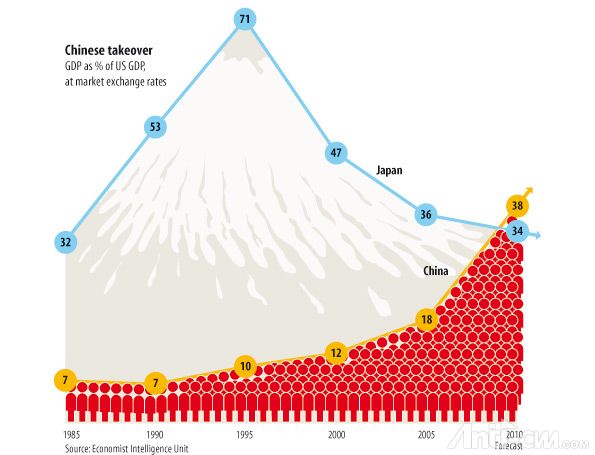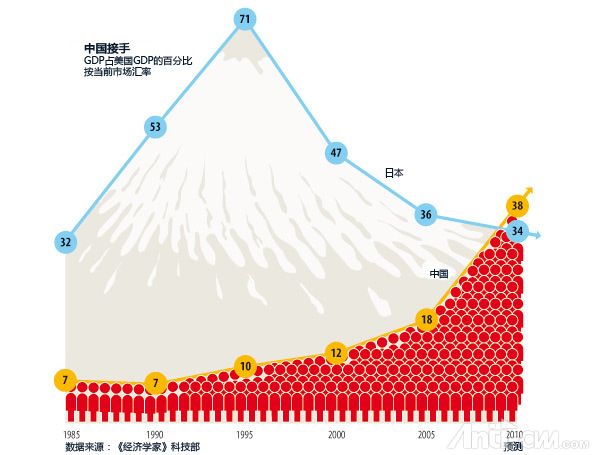【中文标题】巨龙仍在咆哮
【原文标题】The dragon still roars
【登载媒体】经济学家
【原文链接】http://www.economist.com/theworldin/displaystory.cfm?story_id=14742408
【原作者】Pam Woodall
How sustainable is China’s economic boom?

China will reach two economic milestones in 2010. It will overtake Japan to become the world’s second-largest economy (at market exchange rates). And its exports will reach 10% of world trade—matching Japan’s share at its peak in 1986. But China’s economy also resembles Japan in the 1980s in more worrying ways. Will its boom turn to bust as it did in Japan?
China has rebounded faster from the global downturn than any other big economy, thanks to massive monetary and fiscal easing. China’s slowdown in late 2008 was only partly caused by the slump in American demand. It was also self-inflicted by tight credit controls, so the economy responded quickly when the government turned the credit tap back on full and launched huge infrastructure spending. This stimulus will stretch into 2010; private consumption will remain strong, and a rebound in home sales will boost construction. As a result, China’s GDP should grow by around 9%.
But for how long can China sustain such growth? Its GDP has increased by an average of almost 10% a year for the past 30 years. Even assuming a slowdown in the pace of expansion, many economists expect China’s economy to overtake America’s within 20 years. But the same was predicted of Japan in the 1980s before its bubble burst, resulting in a lost decade of sluggish growth. The gap between Japan and America has instead widened.
Some analysts claim that China today looks ominously like Japan in the late 1980s: chronic overinvestment, they say, has resulted in excess capacity and falling returns; a tidal wave of bank lending threatens a future surge in bad loans; and stock and property markets look dangerously bubbly. Banks’ non-performing loans will surely rise in 2010, and unless the government tightens monetary policy it will store up future problems which could harm economic growth.
Luckily there are some important differences between China today and Japan during its bubble era, which make it less likely that China’s boom will end in a prolonged economic bust. China’s GDP per head is less than one-tenth of that of Japan or America. Its economy is still in the early stages of development, with ample room to play catch-up with rich countries by adding to its capital stock and lifting productivity. A successful developing economy should have a higher rate of investment because it starts with much less capital than advanced economies. China’s capital stock is barely half as big as Japan’s in relation to output; capital per person is only 5% of that in Japan. In addition, with almost half of its labour force still in agriculture, China still has plenty of scope to lift productivity by moving surplus labour into industry and services. This is very different from Japan in the 1980s.
China does have excess capacity in a few sectors, most notably steel. But concerns about overinvestment are exaggerated. During 2009, new investment in industries with overcapacity was relatively modest; most money went into infrastructure. And unlike Japan, which built roads to nowhere to prop up its economy, China still needs more public infrastructure. In general, investment in roads, railways and the power grid will help China to sustain future rapid growth.
Over the next decade, China’s annual growth will slow from the 10%-plus pace of the past few years to perhaps 7%—still one of the fastest rates in the world. But future growth will be less dependent on exports. As China’s share of world exports hits 10% in 2010, up from 4% in 2000, Japan’s experience will be instructive. It suggests that there are limits to a country’s global market share: after reaching 10%, its share of world markets fell as the yen strengthened. Likewise, China will be under foreign pressure to allow the yuan to resume its climb against the dollar in 2010.
More of China’s growth will therefore need to come from consumption. Infrastructure investment was the best way to boost domestic demand quickly, but in the longer term the government needs to lift consumer spending by shifting income from firms to households and by improving welfare support and health care. Slower export growth and stronger domestic spending will cause China’s current-account surplus to shrink below 5% of GDP in 2010, less than half its peak in 2007.
Slower future growth, based on more domestic spending and a smaller trade surplus, would direct China to a more sustainable path. Over the past 20 years, China has made an unprecedented leap from being the world’s tenth-biggest economy to becoming number two. At some point, before it leapfrogs America, China may well suffer a nasty slump—but not in 2010.
中国的经济繁荣可以持续多久?

中国将在2010年达成两项经济里程碑。它将取代日本成为世界第二大经济体(以当前市场汇率计算);它的出口额将达到世界贸易总量的10%——与日本在1986年的巅峰期持平。但是,中国的经济也和80年代的日本一样,有很多令人担忧的方面。它是否会像日本一样从繁荣最终走向破灭?
中国比其它大型经济体更快地从全球经济下滑中恢复过来,这要归功于大规模的货币和金融政策放松。中国在2008年底经济放缓仅仅是因为美国需求下降,另一个原因是自身的信用紧缩控制。所以,当政府全面放宽信用政策并实施了巨额的基础设施投资之后,经济迅速给予了积极的响应。这些经济刺激政策会延续到2010年,私人消费势头持续强劲,本土消费力量的反弹将会促进基础设施的建设。中国GDP因此还会保持大约9%的增长。
但是,中国这种增长趋势将会持续多久?在过去30年里,它的GDP平均每年以几乎10%的速度在增长。即使假设其扩张的步伐会逐渐放缓,很多经济学家依然认为中国的经济将在未来20年里取代美国的位置。但是,同样的预测也曾经发生在80年代的日本身上,当然是在其经济泡沫破裂之前,随后是整整10年经济萎靡的增长。由此拉开了美日之间的差距。
一些分析人士认为,今天的中国看起来与80年代的日本一样笼罩着不详的气氛。他们说,长期的过度投资导致了生产能力的过剩和回报降低;一波又一波的银行巨额贷款预示着未来汹涌的坏账;股市和房地产市场处在泡沫破裂的边缘。银行的不良贷款在2010年必定会面临一个高峰,除非政府紧缩货币政策,否则这必将为将来埋下祸根,从而影响经济增长。
幸运的是,今天的中国与泡沫经济时代的日本有一些重要的区别,这使得中国的繁荣不大会转化成经济长期萧条。中国的人均GDP还不到日本或美国的十分之一,它的经济还处于发展的初级阶段,它有巨大的空间来增加资本存量、提升生产率以追赶富裕国家。一个成功的发展型经济应该有更高的投资回报率,因为其初始资本量要比发达型经济少很多。从产出的角度来看,中国的资本存量仅仅是日本的一半,人均资本量是日本的5%。而且,它几乎一半的劳动力都处于农业环境中。中国还有很大的空间来将其剩余劳动力转移到工业和服务性行业中,以提高其生产率。这些都与80年代的日本大相径庭。
中国在一些领域中的确存在生产能力过剩的现象,最明显的钢铁行业。但是,担心投资过度其实是多余的。在2009年,在生产能力过剩行业中的投资相对来说是适度的,大部分的资金还是投向了基础设施建设。日本当时在荒无人烟的地区修建公路来支持经济增长,中国与此不同,它还是需要更多的公共设施。总体来看,在公路、铁路和电力设施方面的投资会帮助中国更好地支持未来飞速的发展。
在下一个十年里,中国的GDP年增长率或许会从过去几年的10%以上下降到7%,但仍是世界上增长率最高的国家。未来的增长会逐渐摆脱对出口的依赖。2002年,中国占世界出口总量的4%,随着这个数值在2010年达到10%,日本的经验则有一些借鉴的意义。它的经验是:一个国家在世界市场上的份额是有限的——在达到10%这个比例之后,日元的升值会迫使其出口量下降。与此相同,在外界的压力下,中国将在2010年放开对人民币汇率的控制,任由其升值。
因此,中国的增长会转而依赖消费。基础设施投资是快速提高本土需求的最好的方法,但是长远来看,政府需要通过以下方法来提高消费支出:变企业收入为家庭收入、改善福利和医疗状况。缓慢的出口增长和强劲的内地消费会让中国的活期存款余额缩水到2010年GDP的5%以下,低于其2007年巅峰期的一半。
基于更多的内地消费和少量的贸易顺差,未来经济的缓慢增长会把中国引向一条更加可持续发展的道路。在过去的20年里,中国史无前例地从世界第十大经济体跃升为第二。在它最终超越美国之前的某个时候,中国必将会经历一个严重的经济萧条过程——但是不会是在2010年。 |